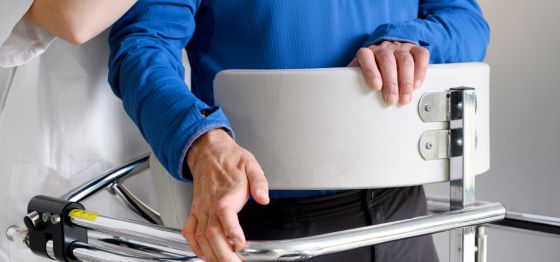Understanding end-stage renal disease (ESRD), also called kidney failure, means knowing more about the organs it affects. The kidneys are bean-shaped organs located at the back of the body on either side of the spine, down near the hips. Most people have 2 kidneys, but survival with 1—due to birth with a single kidney or after donating 1 for a transplant—is entirely possible.1
The kidneys perform essential functions that include:2
- Filtering the blood (approximately 4 ounces/minute) to remove waste, excess water and acid.
- Helping to maintain the right balance of water, salt and minerals like potassium, calcium and magnesium.
- Producing urine that removes waste from the body.
- Creating hormones that help control blood pressure, promote bone strength and make healthy red blood cells.
ERSD occurs when the kidneys stop working and lose their ability to filter waste from the blood. Consequently, the survival of someone with kidney failure is dependent on dialysis or a kidney transplant.3
What are the symptoms of ESRD?
Kidney disease in its early stages often has no symptoms at all, and some people may not know they have it until their kidneys fail.4 However, these symptoms may become apparent as the disease progresses:5
- Swelling in feet and ankles
- Urinating more, or less, than normal
- Muscle cramps
- Loss of appetite
- Nausea or vomiting
- Sleep problems
- Rashes or itchy skin
Anyone noticing these symptoms, especially those who already have kidney disease, should contact a doctor immediately.6
What causes ESRD?
Kidney failure usually results from the cumulative effects of these health problems that can damage the kidneys little by little throughout the years:7
- Diabetes (the most common cause)
- High blood pressure (the second most common cause)
- Autoimmune diseases like lupus and IgA nephropathy
- Genetic diseases such as polycystic kidney disease
- Nephrotic syndrome (protein imbalances in urine and blood)
- Urinary tract problems including kidney stones
- Smoking and drinking too much alcohol
How is ESRD diagnosed?
To determine if a person has end-stage renal disease, the doctor may order and analyze any or all of these tests:8
- eGFR blood test – the estimated glomerular filtration rate is a measure of how well the kidneys are functioning. This estimated number is based on a blood test combined with other factors including age, gender, body type and race.
- Urine test – often called a urinalysis, this is performed on a small sample of urine and may include visual and microscopic examinations, as well as a dipstick test to check for blood, protein, glucose, and acidity.
- Kidney biopsy – a small amount of tissue is taken from the kidney and analyzed under a microscope to check for abnormalities.
How is ESRD treated?
While medical science can’t cure kidney failure, it can treat, slow or stop kidney disease. The two most vitally necessary treatments for ESRD are kidney dialysis and kidney transplant. The need for either one is based on a person’s estimated glomerular filtration rate (eGFR) score, which can range from 100 (full kidney function) to 0 (no kidney function). Anyone with a eGFR score of less than 15 is a candidate for dialysis or transplant.9
Dialysis for ESRD
This treatment, which does not affect the function of the kidneys, takes over their work and keeps the body in balance. There are two types of dialysis:10
Hemodialysis – a machine removes blood from the patient’s body, cleanses and filters it and returns it to the patient.
Peritoneal dialysis – cleansing and filtration takes place inside the patient’s body via a pumped-in solution that collects extra fluid and waste and is then pumped out.
Hemodialysis is usually performed 3 times a week and lasts about 4 hours. A peritoneal dialysis treatment takes 30 – 40 minutes and should be done several times a day.11
Kidney transplant for ESRD
In this operation, surgeons replace a diseased, non-functioning kidney with a new one from a donor who has died or from a living donor. The surgical team determines whether the donated kidney is a good match before the procedure begins. Once it’s over, the new kidney starts filtering blood and removing waste. To guard against the body’s rejection of the transplanted kidney, patients must take anti-rejection medications and immunosuppressant drugs.12
How to prevent ESRD
The best way to prevent end-stage renal disease is to address the diseases that may be damaging the kidneys.13 Since the most common causes of kidney failure are high blood pressure and diabetes, following the prevention tips below can not only help manage those conditions, but may also ultimately help prevent ESRD.14
- Manage blood sugar
- Manage blood pressure
- Maintain a healthy weight
- Eat a heart-healthy diet
- Reduce salt intake
- Drink enough water
- Exercise regularly
Practicing these healthy habits may help older adults to avoid kidney failure down the road.
Go365 by Humana® makes wellness fun and easy. We help Humana Medicare members with Go365® on their plan reach health goals, as well as take care of their physical and emotional health—allowing members to thrive at any age.
Humana Medicare members with Go365 on their plan can enroll in Go365 at
Go365 is a well-being and rewards program for many Humana Medicare Advantage members. Rewards have no cash value and can only be redeemed in the Go365 Mall. Rewards must be earned and redeemed within the same plan year. Any rewards not redeemed by December 31st will be forfeited.
If you need to enroll in Medicare Advantage or change your plan outside of the usual Medicare Annual Election Period, a Special Election Period (SEP) could be the answer. For information on eligibility, visit Humana’s
To learn more about Humana Medicare Advantage, call to speak with a licensed Humana sales agent at 1-844-321-5843 (TTY:711), Monday – Friday, 8 a.m. – 8 p.m. local time or visit
Sources:
1“End-Stage Renal (Kidney) Disease,” Cleveland Clinic, last accessed May 9, 2023,
2“End-Stage Renal (Kidney) Disease.”
3“Kidney failure (ESRD) – Symptoms, causes and treatment options,” last accessed May 9, 2023,
4“End-Stage Renal (Kidney) Disease.”
5“Kidney failure (ESRD) – Symptoms, causes and treatment options.”
6“Kidney failure (ESRD) – Symptoms, causes and treatment options.”
7“Kidney failure (ESRD) – Symptoms, causes and treatment options.”
8“Kidney failure (ESRD) – Symptoms, causes and treatment options.”
9“End-Stage Renal (Kidney) Disease.”
10“End-Stage Renal (Kidney) Disease.”
11“End-Stage Renal (Kidney) Disease.”
12“End-Stage Renal (Kidney) Disease.”
13“End-Stage Renal (Kidney) Disease.”
14“11 tips for preventing kidney failure,” Healthline, last accessed May 9, 2023,
This information is provided for educational purposes only. It is not to be used for medical advice, diagnosis or treatment. Consult your healthcare provider if you have questions or concerns.
Humana is a Medicare Advantage HMO, PPO and PFFS organization with a Medicare contract. Humana is also a Coordinated Care plan with a Medicare contract and a contract with the state Medicaid program. Enrollment in any Humana plan depends on contract renewal.


)

